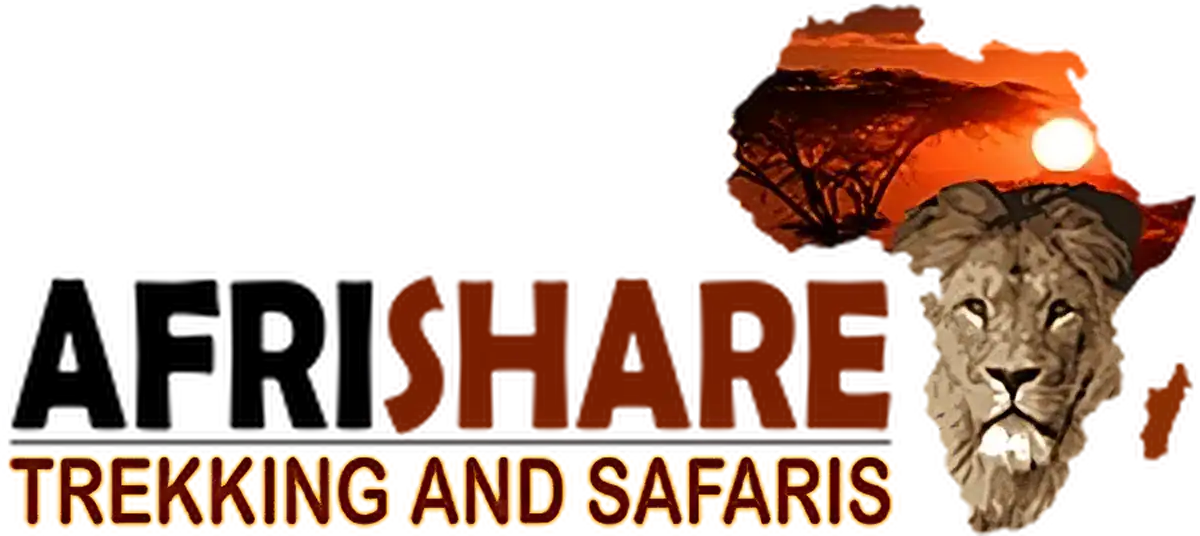Kilimanjaro towers at 5,895 m/19,340 ft above sea level. It is the highest free standing mountain in the world and the “Roof of Africa”.
Mt Kilimanjaro is one of the most popular travel attractions on the continent. Over 40,000 people visit it every year. It’s an incredibly beautiful trek where a climber doesn’t require technical climbing skills. To reach the summit, one needs only a healthy average fitness level.
We wrote this guide to help climbers prepare for their once-in-a-lifetime adventure. All the recommendations below are the results of our 10+ years of experience. Over this time we at Afrishare Trekking and Safaris have organized Mount Kilimanjaro hiking trips for over 20,000 people.
| Category | Details |
|---|---|
| Height | 19,340 ft / 5,895 m |
| Peaks | Kibo, Mawenzi, Shira |
| Trekking Distance | 42 miles (70 km) | Lemosho Route |
| Required Skills | Average fitness level |
| Climate zones | Rainforest, Heather, Moorland, Alpine, Arctic |
| First Climb | 1889, Hans Meyer and Ludwig Purtscheller |
| Kilimanjaro Routes | Lemosho, Machame, Rongai, Northern Circuit, Marangu, Umbwe |
The duration of a Kilimanjaro climb varies based on the selected route. Most journeys span 6 to 8 days. An experienced hiker with prior acclimatization might complete the ascent in an expedited 5-day schedule. If opting to camp overnight in the crater, the climb can extend to 9 days or more.
Among the Seven Summits, the Kilimanjaro trek is one of the briefest. For instance, summiting Mount Everest typically takes 6 to 9 weeks, while Denali and Aconcagua require 2 to 3 weeks. In contrast, Kilimanjaro usually takes around one week.
Climbing Kilimanjaro is moderately challenging but within reach for the average individual. With a reliable climbing operator and adequate time for acclimatization, most climbers can successfully reach the summit.
Yes, Kilimanjaro is accessible to beginners with little or no trekking experience. With some prior training and a good climbing tour, your chances of conquering Kilimanjaro will be very high.
We offer Kilimanjaro group climbs almost every day. If you have specific vacation dates and can’t find a suitable group, contact our managers. We may consider opening a new group on the dates you suggest. To sign up for a trip, we require a $50 deposit only.
Maintaining a reasonable level of fitness is crucial to climb Kilimanjaro. However, summiting Kilimanjaro doesn’t require athletic prowess. A healthy average would be adequate. As a guideline, we suggest assessing whether you can comfortably hike 8-10 km (5-6.2 mi). If you can do it, then you are fit enough to climb Mount Kilimanjaro.
A great exercise for hiking Kilimanjaro is running. Keep training until you can confidently jog 4-5 km (2.5 – 3.1 miles). Good training programs are available at the Nike Running Club app.
Swimming is an excellent complement. Swimming strengthens your entire body and improves your heart and lung endurance. This makes it a great addition to running. The first primarily focuses on leg endurance. Swimming takes it further by engaging the arms, core, and legs at the same time. Water buoyancy is also good for people who want to protect their joints while exercising.
Finally, it is great if you have any rural areas nearby with rough hiking trails. Aim for longer ones, ideally in the 10-15 km (6-10 mi) range. Remember, most of the Kilimanjaro hike will be uphill. So, training over longer distances in the countryside will prepare you for the Roof of Africa.
You may also check our Kilimanjaro training plan. It’s useful for building your stamina and fitness for the climb.
Tanzania has two rainy seasons and two dry seasons. The short rainy season begins in early November and lasts until late December. It is followed by the dry season, which lasts until mid-March. Then the season of long rains begins, ending in mid-June.
You should consider the northern slopes to climb Kilimanjaro during the rainy season. According to the data we received from the Tanzania Meteorological Authority, this part of the mountain receives five times less rainfall. Good Kilimanjaro routes to choose from are Rongai, Northern Circuit, and Marangu.
One should also remember that the period from June to October in East Africa is marked by cold nights. At the high altitudes of Kilimanjaro, the nights will be pretty chilly. Make sure you have everything from our packing list.

Our mission is to provide you with the best possible safari and trekking at the best possible price and to bring to you a unique and memorable African experience.


Copyright © 2024 Afrishare Trekking And Safaris | Designed By Technoclick Tanzania